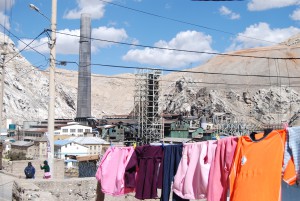More trade, more mining company lawsuits
Under a proposed free trade agreement between the US and Colombia, mining companies could file suit for failure to approve an environmental permit or new legislation that would impose environmental or public health requirements on a mining project.
This week, the US Congress will take up a free trade agreement between the US and Colombia. This agreement has been widely opposed by human rights and labor groups because of Colombia’s poor human rights record. Oxfam has also opposed this agreement out of concerns about its potential impact on small farmers, particularly women.
But, one issue that has received less attention is the potential of the agreement to undermine Colombia’s progressive legislation on indigenous peoples and its ability to take action to protect human rights and the environment. Tucked into the agreement–as in almost all trade agreements of this type–is the “investor-state” clause. This provision will enable foreign investors to sue the Colombian government for violating their ‘rights’ and demand compensation for any measures taken that may affect anticipated future profits. Mining companies could file suit for failure to approve an environmental permit or new legislation that would impose environmental or public health requirements on a mining project. Such actions constitute, in trade jargon, a violation of the standard of “fair treatment” and/or a “taking” of a company’s property, and governments can become the target of lawsuits which are settled at international tribunals.
Mining companies have aggressively used these “investor-state” provisions. In 2003, Glamis Gold sued the United States under the North American Free Trade Agreement (NAFTA) over action by the state of California to require the company to backfill mining pits at its operation in the southern part of the state. The case dragged on for six years until the US government ultimately won in 2009. In El Salvador, Canadian mining company Pacific Rim is using the investor-state provision of the Central American Free Trade Agreement (CAFTA) to seek $77 million in damages from the government for failing to approve an environmental license. The company’s proposed project has contributed to tensions, violence, and killings in the northern Salvadoran region of Cabanas. A decision on the admissibility of the case is currently pending.

In one of the most egregious cases, US company Doe Run has filed an $800 million suit under the US-Peru Free Trade Agreement against the Peruvian government, alleging that it failed to clean up the town of La Oroya where the company operates a 100-year-old lead smelter. The town is one of the most polluted in the world. The Peruvian government and local civil society organizations argue that Doe Run failed to comply with its environmental clean-up commitments.
Colombia could soon face suits like this as well. In March 2011, the Colombian government denied an environmental permit to Canadian mining company Greystar. Had the US-Colombia FTA been in place, the company might have brought an investor-state suit against the government. The fact that the company is Canadian wouldn’t have mattered. Mining companies use legal chicanery to incorporate themselves in whatever country suits their purposes. In the Pacific Rim case in El Salvador, the company actually suing the government is not the Vancouver-based one, but a “US-based” subsidiary, which seems to exist for the sole purpose of filing the CAFTA claim. (See an amicus brief submitted in this case.) Such transparently bogus attempts by mining companies to claim “residency” would be laughable if their potential impacts weren’t so serious.
Because of the “chilling effect” that investor-state provisions in free trade agreements can have on government efforts to regulate industry to protect the environment and public health (particularly in high-impact sectors like mining), a broad range of groups have called for their elimination. We support this position, even though we think it’s unlikely that corporations will allow governments to drop such sweeping protections.
If investor-state provisions can’t be eliminated entirely, then the capacities of governments to negotiate better contracts with mining companies should be strengthened. Governments, which now have more leverage than in the past due to high minerals prices, should push to include provisions in mining contracts that protect public health and environmental regulations. Doing so could help ensure that foreign investment actually benefits the country and local communities, and does not merely line the pockets of shady corporate operators.